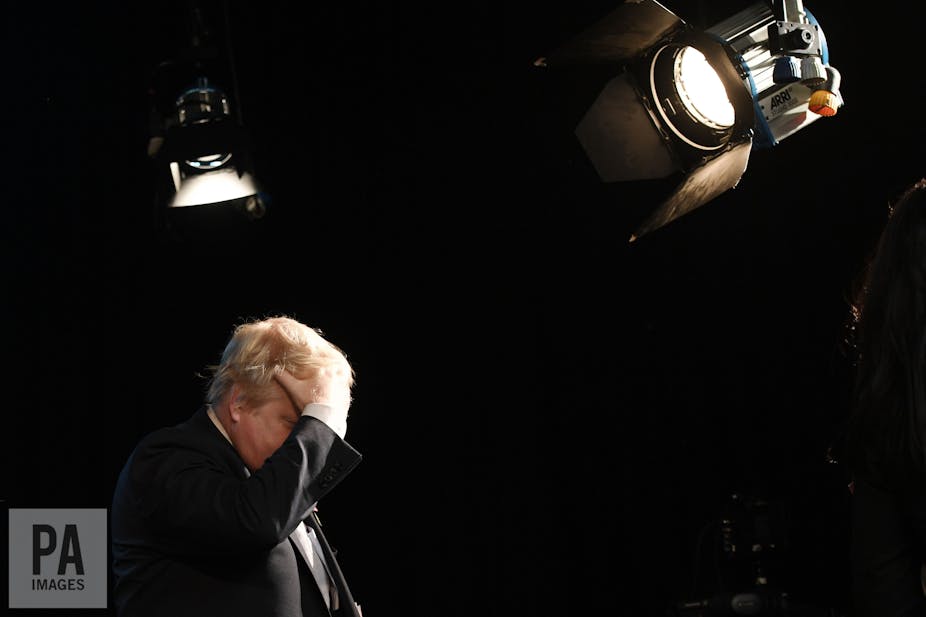Foreign secretary Boris Johnson’s recent comments about the plight of a British-Iranian citizen imprisoned in Iran highlights the foreign policy implications of a casual political remark. But the incident is also symptomatic of a larger crisis in Britain’s diplomatic machinery that has paradoxically little to do with foreign policy.
Johnson appeared to be either poorly briefed or badly prepared when he told parliament that Nazanin Zaghari-Ratcliffe had been “teaching people journalism” when she was arrested in Iran.
Given that this conflicts with her family’s account that she was on holiday, such remarks have been interpreted by the Iranian judiciary as evidence for her allegedly spreading propaganda and unrest against their ruling regime. They could even lead to her time in jail being extended. Johnson’s comments are being described on Iranian state television as an “unintended confession of the UK government about the real plot” behind Zaghari-Ratcliffe’s trip.
The foreign secretary later admitted that his remarks “could have been clearer”. Johnson had to call his counterpart, Iranian foreign minister Javad Zarif, in an attempt to “clarify” his point. But words cannot be retracted in international diplomacy. That is why foreign secretaries should pay attention to detail and the precision of their words and phrases.
The rap sheet
Johnson’s apparent disinterest in detail and slapdash approach have led to a spate of calls for him to resign from the cabinet. And, of course, he has a history of diplomatic gaffes and blunders. Patience among many within his own party is wearing thin.
In January, he recited a colonial-era poem by Rudyard Kipling in front of local dignitaries in the Shwedagon Pagoda – the most sacred Buddhist site in Myanmar’s capital. Johnson had to be stopped by the UK ambassador to Myanmar, who reminded him that he was on mic and that his recital was “not appropriate” in the former British colony. The country’s sensitivities about British colonialism were met with astonishing cultural insensitivity from the foreign secretary.
In October, Johnson said that the Libyan city Sirte could become the new Dubai, adding, “all they have to do is clear the dead bodies away”. Cruel and insensitive as such comments are on their own, they are disgraceful when spoken by the foreign secretary. Downing Street has rebuked Johnson’s comments, adding: “We did not feel it was an appropriate choice of words.”
Yet, despite Johnson’s lack of professionalism, he is unlikely to be sacked by the prime minister, Theresa May. That is because May wants her cabinet to be made up of both ministers who campaigned to remain in the EU and those who supported Brexit. It’s this intricate balance that keeps Johnson in his job. He is further protected by the enforced resignations of both Michael Fallon as defence secretary and Priti Patel as international development secretary in recent weeks.
May remains much weakened in domestic political terms following the loss of her parliamentary majority in June’s general election and the internal divisions within her party. The ongoing Brexit negotiations have weakened her leadership further and she remains under attack from Brexit zealots. Johnson even published his own “red lines” on Brexit just days after May gave a landmark speech on the matter in Florence.
Johnson’s allies, including the environment secretary, Michael Gove, have been active in the media since his comments about Zaghari-Ratcliffe. They’ve argued that sacking him would be unjustified and that he is doing a good job otherwise. However, both Johnson and Gove were again slapped down by Downing Street for openly speculating why Zaghari-Ratcliffe was in Iran in the first place.
This has further angered supporters of the imprisoned British citizen. Having offered a questionable apology for his original comments, Johnson must now seek to rebuild diplomatic bridges with the Iranian government.
In the interests not only of Zaghari-Ratcliffe, but also of British foreign policy more widely, Johnson would do better to pay closer attention to his ministerial dossiers, instead of seeking to steer the government’s course in other policy domains – including his hobby-horse, Brexit.
This escalating episode is a cautionary tale in how the art of statecraft and international diplomacy can be taken hostage by the intricacies of UK domestic politics and the fall-out effects of Brexit in particular.
Consumed by internal infighting and marred by careerists who are willing to sacrifice policies to politics, Britain’s government risks the Foreign and Commonwealth Office’s good reputation for diplomatic professionalism. Far from becoming a “Global Britain” post-Brexit, the UK is losing influence on the international stage.

